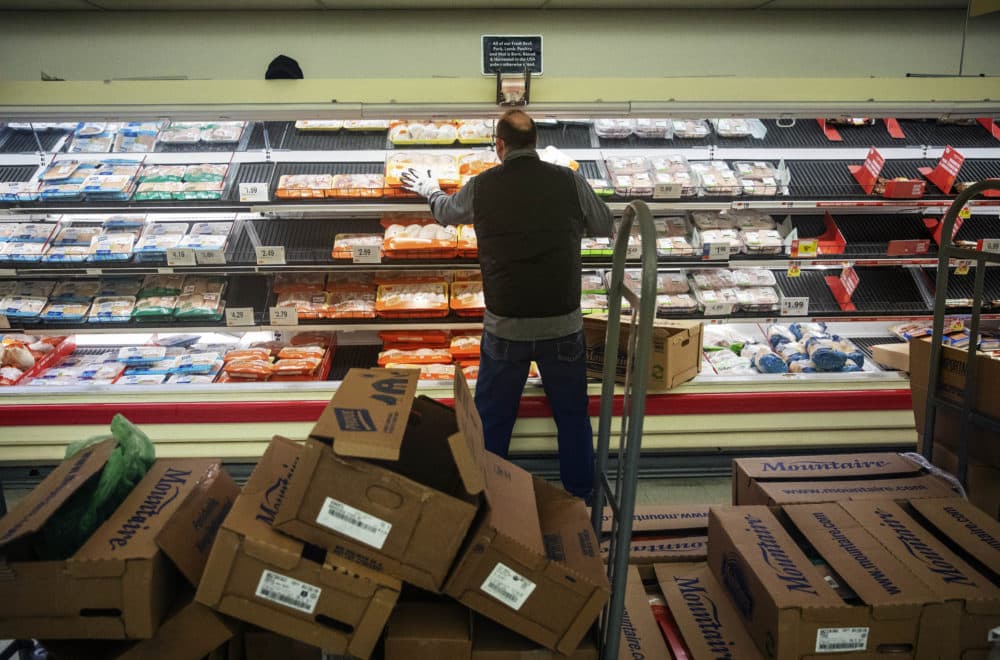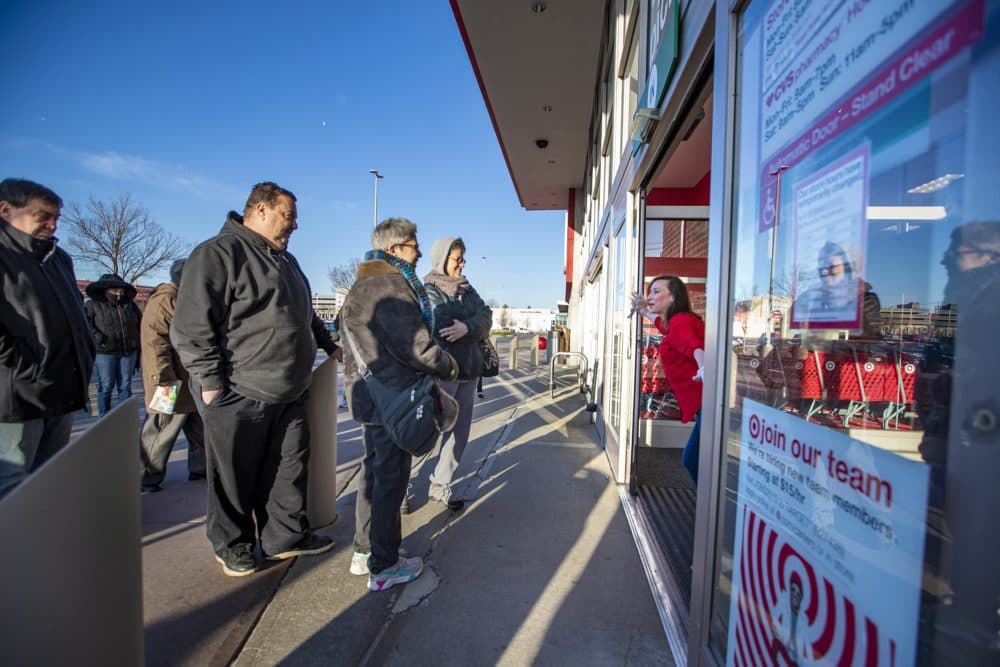Advertisement
Commentary
'Thank You' Is Not Enough: Taking Care Of The People We Need Most And Pay Least

After an intense few days of travel, I returned to Boston on the evening of March 9, just at the inflection point where institutions were shutting down and we were all starting to grasp the urgency of social distancing.
Knowing that we’d be hunkering down for what I still naively thought would be weeks, I went to the grocery store to stock up. It was eerily silent. Entire shelves and freezer cabinets were empty, as was the store, which was equally vacant except for a silent battalion of InstaCart workers staring at their cell phones, fulfilling orders for absent people who were having their groceries delivered.
These were the only people working — the cashiers and the meagerly paid stock clerks — humans who, prior to the pandemic, were at risk of gradually being replaced by self-checkout machines and eventually by robots so that major retailers could save just a little more money.
I’ve been back to the store twice since then. As the cashier in Star Market rung up my groceries, as I passed a woman in scrubs in the parking lot wearily slamming her car trunk shut, as the mailman made his increasingly lonely way down the block, I found myself thinking, “Thank you for your service.” Thinking but not saying it, as however sincerely spoken, the phrase (once reserved for members of the military) felt too automatic.
Instead, I tended to say something a bit more personal. “I’m so grateful that you’re working,” or “You guys are the best.”
Crises like this one reveal the underlying precariousness of survival among those working in the service economy.
It’s only as I write this that I realize that I rarely asked, “How are you doing?” — a question that under normal circumstances I’d never ask of a stranger, but that under these conditions feels not only appropriate, but essential.
Perhaps it’s because the answer is so obvious. “Scared, tired, relieved to be earning money,” I expect they’d answer. “Glad to be able to help, frightened of helping, afraid to lose my income.”
Crises like this one reveal the underlying precariousness of survival among those working in the service economy. This is not an epiphany to the workers, of course, but may be to those of us so routinely blind to our dependence on the people we need most and pay least. I’m talking about the working poor — the home health aides who make an average of $13.50 an hour and rely on food stamps to feed their families, the delivery drivers, many of whom lack basic sanitary supplies in their warehouses. I’m thinking about the roughly one million Uber and Lyft drivers who may work up to 80 hours a week under normal circumstances just to make ends meet and now, facing income reductions of around 60%, are lucky to gross $100 in a 15-hour shift.

Contrast the financial hardship so many are facing with a message I received from my nephew, a bartender in Canada: “I'm currently laid off as the government ordered all bars, gyms, etc. closed … I'm feeling very thankful … that I live somewhere with access to healthcare, that has taken swift action to stop the spread of COVID-19 and also has already laid out a plan for workers like me to get $573/week until the crisis ends. To those with mortgages, kids, and car payments, there's still more to do, but this will be enough for me at the moment.”
Notice the calm and the basic human decency, not just in his message, but in the government action it’s describing.
Now contrast that with the current situation for American workers, where the less you earn, the less likely you are to have any form of paid sick leave. Data from the Bureau of Labor Statistics indicates that 92% of workers in the top quarter of earnings have some sort of paid sick leave, versus only 51 percent of those earning wages in the lowest quarter ($13.80 per hour or less). And among those earning $10.80 per hour or less, that figure drops to 31%.
The battle waged in the House of Representatives before they passed the first piece of COVID-19 relief legislation centered largely on which employers would be required to provide paid sick leave, and on whether those benefits would be temporary or permanent. Unsurprisingly, the Republicans in Congress succeeded in exempting companies with fewer than 50 employees and those with more than 500 employees from this requirement — an exclusion that bars roughly 18.5 million people from receiving even this temporary benefit. That position is not only punitive towards the neediest workers, but to the tens of millions of people exposed to those potentially infected employees.
If there is to be any silver lining to this spiraling trauma, it will be in what it reveals.
The pandemic has further exposed the striations of class, highlighting not just how vulnerable the working poor are, but how heroic and profoundly indispensable.
That’s the reason — sadly, the only reason — that Congress is taking some basic, long-overdue measures like temporarily guaranteeing sick leave to the 24 percent of civilian American workers who don’t have it, extending unemployment insurance, and requiring insurers to offer free Coronavirus testing (if and when kits are available, of course). What’s so stunning is that these are extraordinary measures, not the norm.
The pandemic has further exposed the striations of class, highlighting not just how vulnerable the working poor are, but how heroic and profoundly indispensable.
At least not yet.
I’m wary of making political predictions and am usually wrong. But I hope and believe that what so many Republicans fear — the prospect of American workers demanding that such fundamental rights as paid sick leave and adequate unemployment insurance are available on a permanent basis, not just in times of crisis — may yet come to pass.
Like suppressed and finally erupting magma, the pandemic has blown up the crust of privilege on which so many of us amble through life, thinking we’re on solid ground.
Come November, assuming that Trump and Barr don’t find a way to cancel the election (which may be an overly optimistic act of faith), the American electorate has the opportunity to declare that there is no turning back. And hopefully, a new wave of leaders, those who haven’t swum in the Senate pool, will listen.
